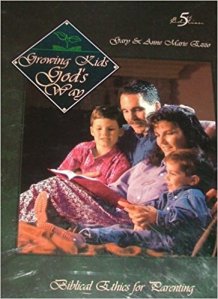I wish I better knew how to explain the trauma of having had my whole life defined for me. The trauma of Growing Kids God’s Way teaching my mother how to train me into “instant obedience,” how to make me only see the world through her eyes.
There’s so much, I can’t even talk about it, because the scope of it all was daily, active, constant undermining, until the words are written all over me. Story, after story, after story: nothing bad had happened to me. I can’t be mad at my brothers for hurting me, they have trauma and I don’t. I can’t have negative emotions: that’s PMS, that’s proof I might be going crazy, her reading natural medicine woo cures to tell me what I needed to look out for because of all my children you’re the one most likely to develop schizophrenia, okay I don’t have emotions anymore. Crying is manipulative, my emotions are suspect, emotions are things girls use to get their own way. I wasn’t allowed to be sick it’s allergies my mother would tell everyone, I wasn’t allowed to name or define my life, my feelings, my hurt, my pain, nothing, not ever, these stories on loop and repetition all the time. She told me who I was, she told other people who I was, until to challenge it would be to unravel a narrative so loud, I wouldn’t know how to speak louder. I was always suspect: not allowed to change my mind, to contradict a previous thing I once said about me, no matter how old I got, no matter if a previous statement was something I’d said as a child, it was held to me like an affidavit of self, and I committing perjury if I said otherwise.
I deal with a lot of dissociation from childhood sexual abuse, but I wish I could explain this dissociation: it is too dangerous, to have your own thoughts. You are not allowed to challenge what she calls you, how she defines you, you are not allowed to say you have an internal sense of self that contradicts anything she believes about you. The words themselves aren’t real, the emotions literally feel like they are behind a wall, my own visual sense of my body always relegated them to this place in my back, stirring around, unable to be pulled out.
There is a version of me that lives over my skin, a version of me still prone to coming out when I am small, and afraid, when the situation feels dangerous, when I worry that the other person has all the power to take my every thought and emotion and say no you’re wrong. No you sound crazy. No you’re not allowed to think that about yourself. And this person lived every single solitary day in that home, in that family, because there was no other choice. There was no other person who was allowed to be, it was a self created by my mother, out of my mother, and she poured it onto me until the weight of it pressed everything else down.
And how do I make anyone understand that? How do I tell them how easily the me I created out of vengeance, out of spite, out of defiance, out of rejecting the flimsy shell of a person my mother made me to be, is so fragile, so unused to being fully present, that they are easily gone, blown away by small breezes, by phrases and looks no one could even know had the power to do that to me?
Yes, it was emotional abuse, yes it was mental abuse, but the obedience of it, the Evangelical Christian story of it that made it possible to not only tear me down, not only manipulate and gaslight and insult me, but also make me agree with it, make me unable to see anything but that because to do so would violate reality itself…where is the language for it? And how do I explain how miraculous it feels sometimes, that I could even make a self? That I didn’t so fully shatter there was no climbing out of that? How do I tell someone what it cost me, so that they can know that what looks like someone so weak, and small, so far behind every moment in life, didn’t die? Can you believe it? That I found a discernible “I” somewhere in there, something unattached to her, something I created that’s me, that’s mine, that pulled out all the trauma and fear and hurt and anger and memory and being and self that were crushed and mangled, broken and convoluted, missing pieces and unable to be fully put back together, and made something of it all?
Sometimes I feel like trauma words aren’t enough. That I can’t find myself in anything. That I am looking for a language, but no I don’t want those, not that book, not that theory, not those definitions and meanings. Just someone to tell me they know these kinds of childhoods, they know the kind of self crushed and weighed down by someone who defined you, who made you obey those very definitions, who made it so that your self is so tentatively alive, you’re not even sure all the time how real you really are.
Do you know what it is, to see the world through so many different eyes, it’s like the sun itself exists in multiple versions of brightness? The emotional meaning of every object, of every thought, the feeling of your body itself, the metaphor for how light bounces off the version of you you see in your head, ever shifting, ever changing in meaning, in want, in focus? Because most of the time, I’m not even sure I share the same reality with other people. I’m not even sure whose version of the world is right. And, to quote from one of my zines: of course I’m crazy, mother. You made me that way.


 When my girlfriend read through the draft of my book, she had a comment about how I mention Growing Kids God’s Way only in passing.
When my girlfriend read through the draft of my book, she had a comment about how I mention Growing Kids God’s Way only in passing.